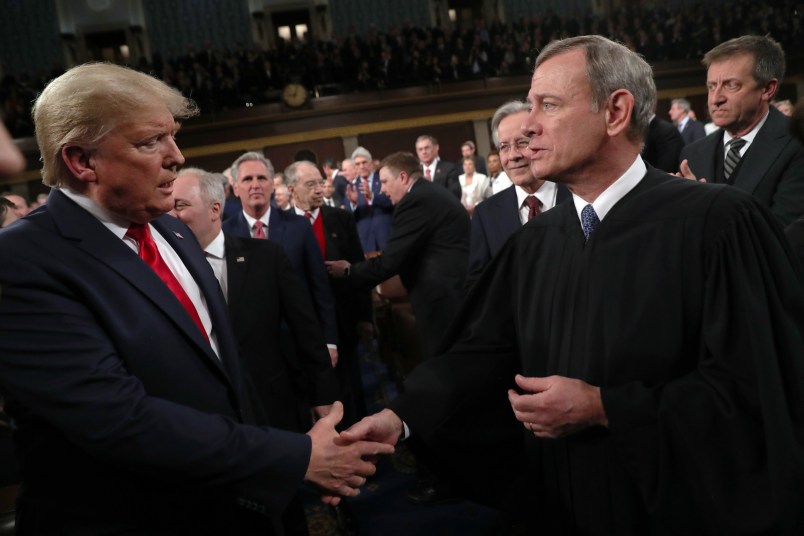The Supreme Court agreed to take up a case Friday (FCC v. Consumers’ Research) in which an advocacy group describing itself as an adversary to “woke” corporations wants the right-wing justices to escalate their hostility to federal agencies.
The group, Consumers’ Research, is challenging the system by which the Federal Communications Commission (FCC) ensures universal telephone and broadband access. A private, not-for-profit corporation works as an extension of the agency to manage a fund that providers must pay into to subsidize these services in rural areas, for low-income families and in schools and libraries.
Consumers’ Research had shopped its challenge to the system around unsuccessfully — being rejected by the 6th and 11th Courts of Appeals — before striking gold at, where else, the 5th Circuit. While a panel rejected its challenge, the full court sided with the group on rehearing.
The 5th Circuit found that the fund setup violated the nondelegation “doctrine,” the idea that Congress can’t outsource any legislating to the executive branch. The theory has been dormant since the 1930s, but conservatives have been exhorting the right-wing majority to revive it in recent agency challenges. The court’s majority concluded that there were two, overlapping nondelegation violations: a) that Congress had impermissibly outsourced its taxation powers to the agency and b) that the FCC had, in turn, impermissibly empowered the private company to administer the fund. The majority found that the two pieces in tandem were unconstitutional; it did not come to a decision on each piece separately.
The Biden administration asked the Court to hear the case, pointing to the newfound circuit split. It’ll likely be argued in the spring and decided by early summer.
The Court, in agreeing to hear this case, could be signalling its willingness to step up its war on agencies, working hand-in-hand with a second Trump administration hellbent on unwinding regulations and wiping out the administrative state. If the Court embraces a robust version of the nondelegation doctrine, it would have near limitless power to reject any agency action it doesn’t like under the auspices that it is an improperly given legislative power. As these are the justices who overturned the Chevron doctrine last term, such an escalation wouldn’t be out of left field.
But the Court has also given itself a couple of offramps. It could just focus on FCC’s empowerment of the private company as the problem (and not Congress’ initial grant of authority to the FCC). That question, whether an agency can delegate power to a private company, is a much more niche one than the greater universe of Congress empowering agencies.
It also instructed both parties to consider another question neither brought up independently: “Whether this case is moot in light of the challengers’ failure to seek preliminary relief before the Fifth Circuit.” If it finds that the case is moot, it could dismiss the case without getting into the merits.
Still, for a majority itching to flex its muscle against federal agencies, the case may prove too tantalizing to let sail by.
The Best Of TPM Today
DOJ Moves To End Jack Smith’s Trump Prosecutions
With Matt Gaetz Out, Pete Hegseth Is Now In The Hot Seat
Our New World of Shiny Objects Rushing Across the Sky
Yesterday’s Most Read Story
What We Are Reading
Trump and GOP eye new limits on Consumer Financial Protection Bureau — Washington Post
Donald Trump’s return sends shivers through the anti-misinformation world — FT







But billionaire special interests can spend without limits or oversight to insource all the legislation they want through an executive branch having unlimited power, since, by definition, it would all be at the discretion of the immune king.
I mean, the Chief Executive. With full pardon power.
Hmm if the rural areas got no phone or internet would it be safe to go back Twitter? s/
Does Consumer’s Research want the FFC to handle this as an agency?
Rural Electrification and similar programs brought much of rural America into the 20th century. Without (taxpayer-funded) government support, reliable electrical and telephone service (and, later, cable television and internet) might not have reached some of those areas.
So is providing those services ‘woke’? If ‘woke’ is ‘enlightened’ then the answer is yes.
It is SOCIALISM!!! Damn Commies want me to have power, water and indoor toilets! What happened to FREEDOM?
Nice cat. It would be a shame if something happened to it.